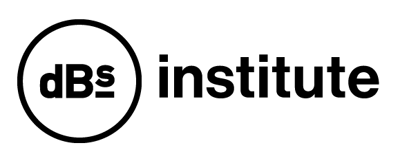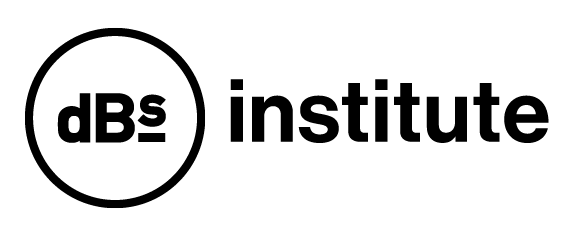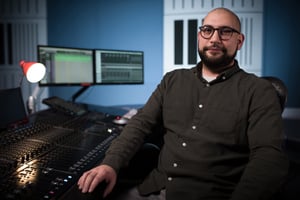After graduating from our FdA Music & Audio Technology degree at dBs Plymouth, and a subsequent top up to a full BA in Oxford, Ryan Green found himself freelancing at Shepperton Studios, part of the world-renowned Pinewood Studios group.
Now a full-time member of the team and currently working as a junior mixer, we caught up with him to learn more about the world of localisation for large-scale film projects.
Movie fans will already be aware of the enormous importance of Pinewood Studios, but for those of you who don't recognise them, they are one of the biggest studios in the world dedicated to the production of high-quality cinema.
Though usually celebrated for their huge sound stages that have been transformed into some of cinema's most iconic sets, they're also industry leaders in localisation, providing the service in over 40 different languages. So, you can imagine our excitement when we learned that graduate Ryan Green had landed himself a freelance position on the localisation team back in 2017.
We caught up with him to learn more about the world of localisation, it's growing importance in the film industry and how it all works.
Before we get into your work at Pinewood, could you talk to us about how you initially landed the job?
"I always say that getting my foot in the door there was not so much luck, but I think the universe definitely threw me a bone with that one. I remember finishing uni and I'd really discovered a love for post-production. I was sending out my CV to a load of studios and within a month I was invited to interview at Shepperton Studios, who are part of the Pinewood group. This was on a Friday, and after asking how good I was at Pro Tools and a few other things, they asked if I could start on Monday. I was still living in Devon at this time, but I just said yes and figured out how I'd make it work afterwards."
You're now a full-time member of the team, but your initial role was a freelance position. Is that quite a common way of finding work in this area of the industry?
"Yeah, I think a lot of the industry is based on freelance work. People come into it on a project-by-project basis for a certain amount of time and work through the busy periods. There's definitely a lot of people that like to work freelance and bounce between different studios on different projects."
Your first few years were spent as part of the localisation team working on international versioning. Could you explain what that is?
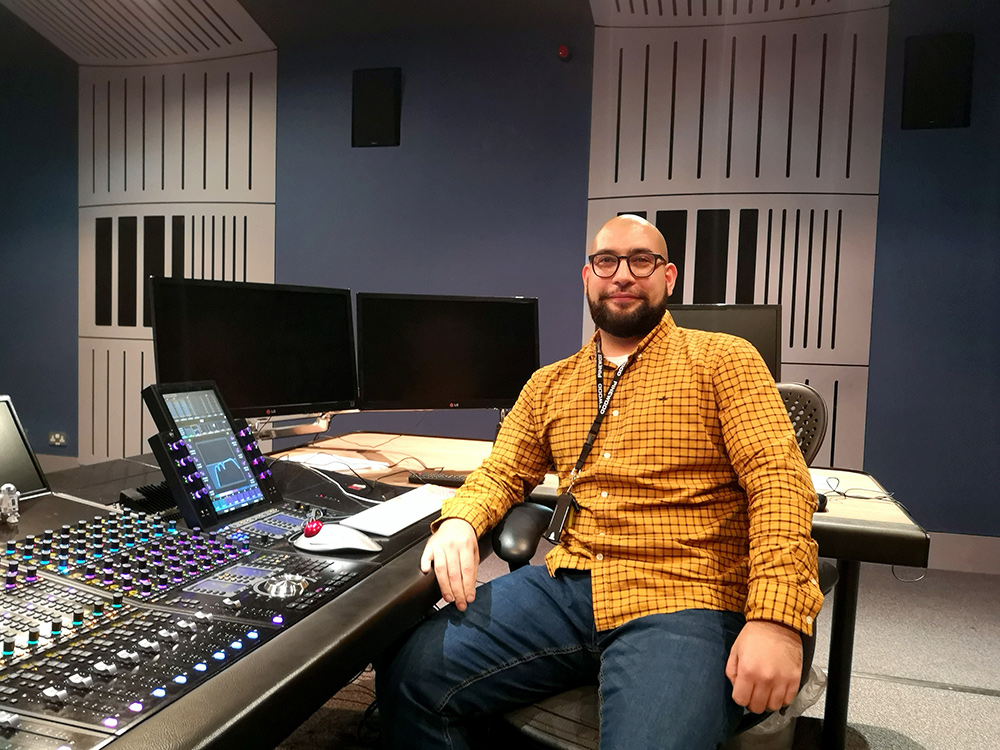
"All the big blockbuster films get released worldwide and the localisation process is casting voice actors who match the original actors in the film and recreating the dialogue mix in a different language.
"The work is split between an editorial team, who will go through the reels, which are usually 20 minutes long, and they make sure that all the dialogue we've been sent is to a good standard, and that it matches the correct cut. They will also handle the dialogue editing in the mix itself. Then, when that's all been done, it will be sent to the mix team to then create a Printmaster, which compiles all those individual stems into a composite soundtrack.
"As a product, it's become a huge thing - some of the biggest studios take massive amounts of revenue in places like China because of it. It's an art form in itself because you're taking something which has been made and completely recreating it, almost to the point where you can A/B between the two and everything from levels perspective, reverbs and all the treatments are exactly the same. When you think of films and the amount of sound design involved, people are really pushing the boundaries of what is sonically possible and having to replicate that is quite a job."
Who finds those voice actors to match the original cast?
"A lot of studios will have a team that spend all their time casting voice actors. In some countries, you have personalities who will always be the voice over for a certain actor, for example there's a German Tom Cruise. So when we get it, it's already been through the process and finding the right voice actors and they're happy with the recordings."
What kind of turnaround are you usually working to on a film project?
"I would say on average, we receive the dialogues for every single version and edit the dialogue for each within 48 hours for the entire film, and then when it goes to mixing, that would normally be a week turnaround to have a version finished, though that's dependent on how long the film is.
"Another variable is how many versions we need to create - some of the really big releases have had up to 42 languages, so it can be really tight to get everything done."
How big a team are you working with in order to get these projects out the door in time?
"There's normally around 6-7 full time editors, and then if it's needed, we would bring in five freelancers. And then, for the mixing side, it depends on how many versions we're doing and how much is scheduled, because I think we have about 10 theatres, and they're normally all full, so you get really good at juggling projects and staying on schedule."
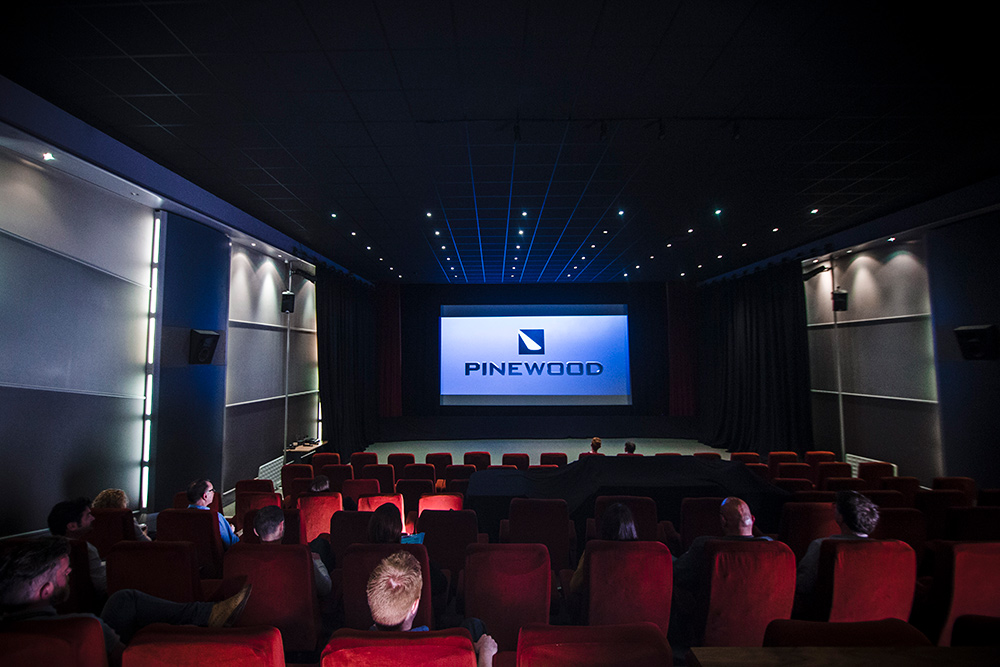
The John Barry screening theatre at Shepperton Studios
[Photo credit: Pinewood Group]
What's the process for actually completing a project as efficiently as possible?
"We make templates. When I was still working as an editor I was team leading for a while, so if we were doing a film, part of my role was making the templates, which we would use for the entire film and every single language would go through the same template.
"To start with, we get sent the all the elements. so you'd have dialogue stems and all your music and effects and then I will watch through the film and run those elements together and you figure it out as you go along. The first version I would be track-laying the film, which would involve me making markers in Pro Tools for things that might be a problem, like any panning or treatment needed on the dialogue. With regards to treatments and sound design elements, you sometimes get instructions or you'd get some presets for some plugins. Sometimes you don't and you have to work it out yourself.
"That first template would take a while and you're kind of sussing it all out, but once it's templated it's just following that and getting every language to match."
How long did it take to acclimate to working with different languages?
"When you don't speak a lot of the languages that you're editing it can seem like a very bizarre concept at the beginning. The way we process that is we have the English coming out of rear speaker on the surrounds, and then the dialogue that you're editing coming out of the centre.
"It's all about learning to switch your brain to hear those two different sounds and get them working and sync it with the picture. It took a bit of getting used to, but the more time you spend with these languages, the more you understand where their sync points are as well as recognising the flow of a specific language. The voice actors are obviously giving a performance, too, and it has to match but at the same time, the delivery of the language has to work for the territory, so it's a fine balance."
What would you say makes a good international version?
"On the editorial side, having a very good voice match is key as are good recordings, and the performance has really got to match. On the mix side, it's just got to match, you should be able to A/B between the two and it should be almost a seamless transition, and the only thing that changes really is the language, not the sound. When you get it to that point, I think that's where it's good.
"Some languages are very dynamic, so when we get recordings from somewhere like Thailand, the way that they speak the language and perform it is so dynamic, and you don't get that with with other languages. You can literally see on the waveforms how it moves up and down. So a big part of creating good international versioning is just learning to work with these languages and understanding how they work as individual elements."
What are some of the other idiosyncrasies you encounter when working with different languages?
"In the mix and the sound, certain territories prefer certain things. So a lot of Eastern Europe, the 'ess' sounds and the harshness is what they like, which makes it very different compared to working on a English-speaking project because you would normally de-ess it quite a lot.
"When you hear a lot of domestic mixes they are very smooth, whereas Eastern Europe they like it very bright, very 'ess'-y, because it's such an integral part of the language and the intelligibility of that. I remember when I first started working I found it to be very harsh on my ears, but you quickly learn about these quirks and differences the more you work with them.
"I think sonically, you just have to become used to these languages that you don't understand and a real big thing is levelling that out in the tails of words and these tiny little syllables, which really make a difference to someone being able to understand the language. If you have a client or someone who speaks the language and they ask to hear a line without any music, sometimes you'll play it and they're like, 'That needs to be pushed, because you wouldn't understand that if you can't hear this syllable at the end.' That's a big learning curve."
What have been some of the biggest lessons you've learned in your time at Pinewood?
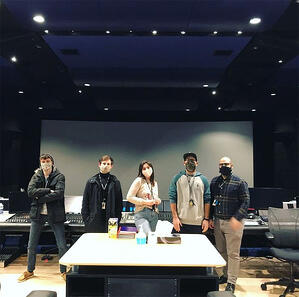 "The top thing I've learned I would say is people skills and just getting on with everyone is invaluable. If you get on with somebody, there's always that chance you're going to get called in to do another job.
"The top thing I've learned I would say is people skills and just getting on with everyone is invaluable. If you get on with somebody, there's always that chance you're going to get called in to do another job.
"That extends to working with clients, too, now that I'm working on the mixing side of things and often presenting to clients. You've just got to spend time around people, and also have to get used to things going wrong or things not going quite as you'd like.
"Learning to keep perspective, taking a breath and knowing that it's going to be fine will make a huge difference in ensuring that everybody's happy."
How can someone start laying the groundwork to finding work in this industry?
"Try and get involved in as many projects and with as many people as you can. When I was at uni, I spent all my time getting in contact with people making short films. Half the work I was doing I wasn't getting paid for, but I was involved in stuff like location recording and editing.
"Just try and connect with people and with the bigger studios, try and get your foot in the door in any way because if you can just meet people, and be there at the right time, it will happen."
FIND OUT MORE:
Pinewood Group
Instagram
Distrokid
If the world of motion picture excites you, then take a look at our BA (Hons) Sound for Film & TV degree. Learn more about it here.
